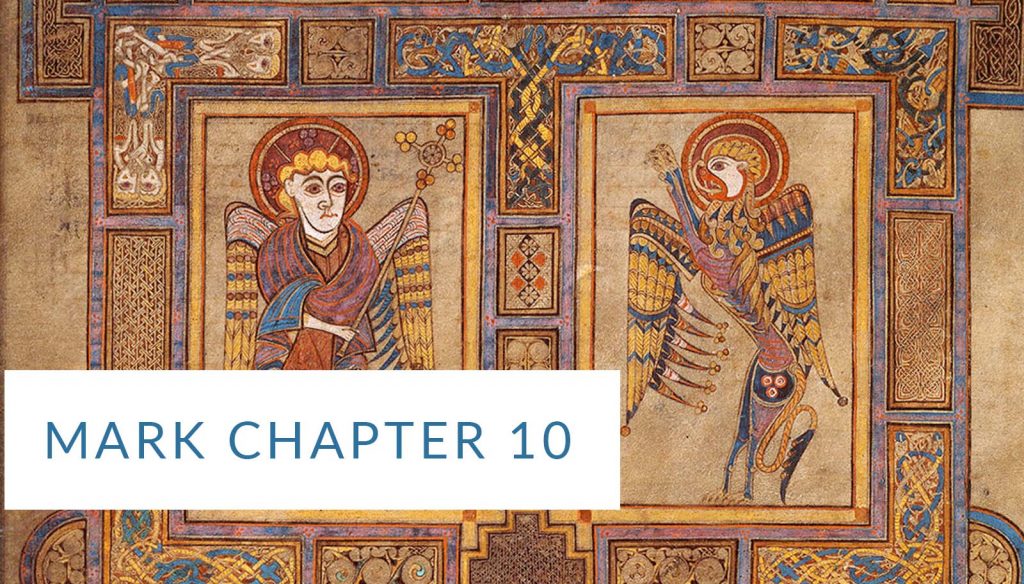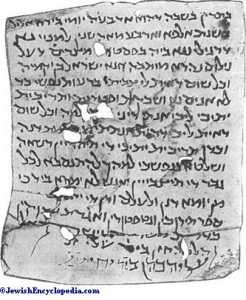This week’s readings are all from Mark chapters 8-9. Each day’s segments of the readings will be posted on this site during the week.
Today's Reading
Then Jesus left that place and went to the region of Judea and beyond the Jordan River. Again crowds gathered to him, and again, as was his custom, he taught them. Then some Pharisees came, and to test him they asked, “Is it lawful for a man to divorce his wife?” He answered them, “What did Moses command you?” They said, “Moses permitted a man to write a certificate of dismissal and to divorce her.” But Jesus said to them, “He wrote this commandment for you because of your hard hearts. But from the beginning of creation he made them male and female. For this reason a man will leave his father and mother, and the two will become one flesh. So they are no longer two, but one flesh. Therefore what God has joined together, let no one separate.” (Mark 10.1–9 NET)
Gospel Parallels
This is the first time in the Gospel of Mark that Jesus has left the Galilee and the other regions to the north (the Decapolis, the Tetrarchy of Philip, and Phoenicia). Now Jesus is going south into the Roman province of Judea (which included Samaria and Idumea). Judea was directly controlled from Caesarea Maritima by Roman Procurators and Governors. The most famous was Pontius Pilate, who was Governor of Judea Province for ten years (according to Josephus). The Roman governors lived in Caesarea, but during festivals or times of tension may have stayed in Jerusalem.
According to Josephus Galileans most often traveled through Samaria on their journeys to Jerusalem, but at times tensions with Samaritans caused them to take different routes. In Mark, Jesus seems to travel on a route that took him down the Jordan River Valley to Jericho, which along the Roman-era road was about 80 miles from Capernaum. Jericho is north and slightly northwest of the Dead Sea and about 17-20 miles to the northeast of Jerusalem. Jericho is one of the most ancient cities in the world, and though it is in a desert region to natural springs it is a beautiful oasis of green vegetation and farming.
Jericho is near the lowest point on earth and is 800 feet below sea level. Jesus is about to make the ascent to Jerusalem, which is 2,474 feet above sea level.
Click on the image below to see the route Jesus may have taken from the Galilee region to Jericho:
Hmmm…image to click on not there…hmmm…😉🤗🤔👍
Okay so... this is a difficult passage (including v10-12 in Tuesday's reading). I think/hope what we shared in the podcast can help when we deal with this one.
Just one other thing I wanted to say, though. I think this passage can/has been used by some towards individuals who have gone through divorce in a way that discourages/judges/holds them down... and... I just don't believe that is why Jesus shares these words. That's not why Jesus came.
“For God did not send his Son into the world to condemn the world, but that the world should be saved through him.” (John 3:17 NET)
“If anyone hears my words and does not obey them, I do not judge him. For I have not come to judge the world, but to save the world.” (John 12:47 NET)
If Jesus shares these words with the goal "to save us" then how does that change how I might receive them? or how I might share/discuss them?
Jesus does a lot of explaining to reveal the heart-effects behind lots of things, and I wonder if that is part of what happens here. Tradition/culture had a way of allowing divorce with a simple piece of paper (and for a handful of reasons) and, as Jimmy mentioned in the podcast, the society was very male-centered, so it was just something men could do almost on a whim...
But Jesus is revealing the gravity of what this kind of separation can feel like—what this part of our brokenness means. I mean... the Pharisees are more concerned about what is "allowed" and, instead, Jesus explains the true nature of things. It hurts both parties involved.
I hope, if you have difficulty in this passage, that you have either been helped/encouraged as we have read it together, or you feel comfortable asking/discussing the difficulty you encounter. And most of all, that you know the love of Jesus above it all.
Travis, thanks for these thoughts. In the past I've had divorced friends feel uncomfortable in the church and this is something I will save in case it comes up again.
In the first-century, the debate about divorce was an active one within Judaism, and that Jesus was asked the question, "Is it lawful for a man to divorce his wife?," places him firmly within that historical context.
Two of the great (and often rival) Rabbinic 'schools' during this period were the House of Shammai (Beit Shammai) and the House of Hillel (Beit Hillel). Another great Rabbi from the early second century was Rabbi Akiva. Here is what the Mishnah records, in tractate Gittin ('Divorces'), regarding the opinions of these rabbis or their houses/schools:
Beit Shammai say, “A man should divorce his wife only because he has found grounds for it in unchastity, “since it is said, Because he has found in her indecency in a thing (Dt. 24:1).”
And the Beit Hillel say, “Even if she spoiled his dish, “since it is said, Because he has found in her indecency in a thing.”
Rabbi Aqiva says, “Even if he found someone else prettier than she, “since it is said, And it shall be if she find no favor in his eyes (Dt. 24:1).”
(m. Gittin 9.10, emphasis added)
Though Jesus often agreed with the House of Hillel on other issues, in this case he agreed with the House of Shammai. In contrast, later Rabbinic thought regarding divorce, like Aqiva, agreed with the interpretation of the House of Hillel (that a man could divorce a woman for anything that he found indecent/shameful in his eyes). This latter interpretation seems to be the dominant position during the first-century, as evidenced in the writings of Philo of Alexandria and Josephus:
But if, proceeds the lawgiver, a woman having been divorced from her husband under any pretence whatever, and having married another, has again become a widow, whether her second husband is alive or dead, still she must not return to her former husband, but may be united to any man in the world rather than to him, having violated her former ties which she forgot, and having chosen new allurements in the place of the old ones.
(Philo, Special Laws 3.30, emphasis added)
(4.8.23) He that desires to be divorced from his wife for any cause whatsoever (and many such causes happen among men), let him in writing give assurance that he will never use her as his wife any more; for by this means she may be at liberty to marry another husband, although before this bill of divorce be given, she is not to be permitted so to do; but if she be misused by him also, or if, when he is dead, her first husband would marry her again, it shall not be lawful for her to return to him.
(Josephus, Antiquities 4.253, emphasis added)
In Hebrew, divorce-document is a get. A get was (and is) a legal, written document between a husband and his wife. All a man had to do was deliver this document to his wife and announce to her that he divorced her. The get contained stipulations regarding their divorce and clarity to any man who wanted to marry her in the future that the marriage was severed and she was no longer married. Gets are still given today, and in traditional Jewish contexts only the husband can approve or grant the divorce.
A Hebrew get from the Cairo Genizah, dating from around the 11th-12th centuries C.E (click to focus on image):


